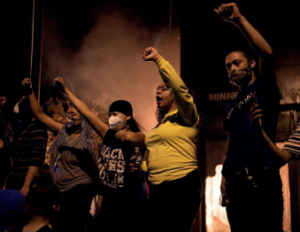Conferencia híbrida
Inclusion and diversity have marked the demands of social movements in the 21st century. With the concept intersectionality, inspired by feminist movements in the US, the academic field aims to understand how various interdependent conditions of oppression and inequality–class, gender, religion, ethnicity, skin colour, citizenship, migration, geography, and language–are reflected in exclusion, but also in the articulation of differentiated demands and struggles. Much less visible have been the voices of academics and activists from Latin America, who have both made perceivable and conceptualized social and political exclusion from the peripheries.
This series of public lectures «Diversity/Medialities» organized by the Ibero-Amerikanisches Institut and Mecila, focuses on these voices from the margins, their long-term conceptual and epistemological frameworks, and their forms and media of circulation and entanglements. With the first focus on feminist and LGTBIQ movements and ideas we invite experts and activists analysing South-North interconnections in the struggles for the rights of women and LGTBIQ groups in Latin America.
[Lecture Series “Diversity/Medialities”]

Image: Hungryogrephotos, CC0, via Wikimedia Commons
The emergence of black counterpublics have shed light on new aspects of the anti-racist struggle in Brazil in comparison with institutional achievements of recent decades against racial prejudice, institutional exclusion and socioeconomic inequalities. In his lecture, Rúrion Melo (Universidade de São Paulo / CEBRAP / Mecila) analyzes the reasons why anti-racist struggles outside the State, which are socially self-organized, erupted shortly after a period of institutional achievements by the Brazilian black movement.
What are the everyday experiences, social practices, and forms of self-organization that characterize the new political cultures of black counterpublics? And how would an intersectional perspective on social oppression and forms of political resistance can help to understand the new paradoxes of anti-racist struggles in Brazil?
> Participate online via Webex Meetings
In cooperation with Ibero-Amerikanisches Institut.